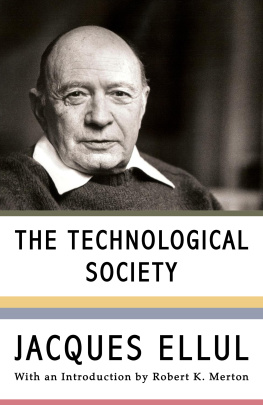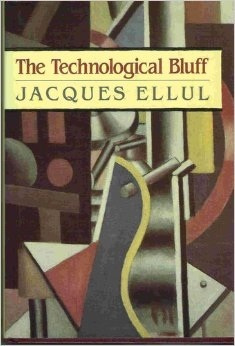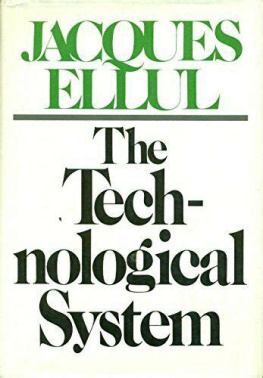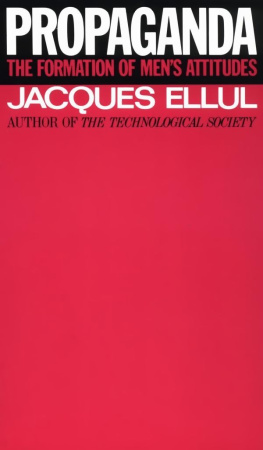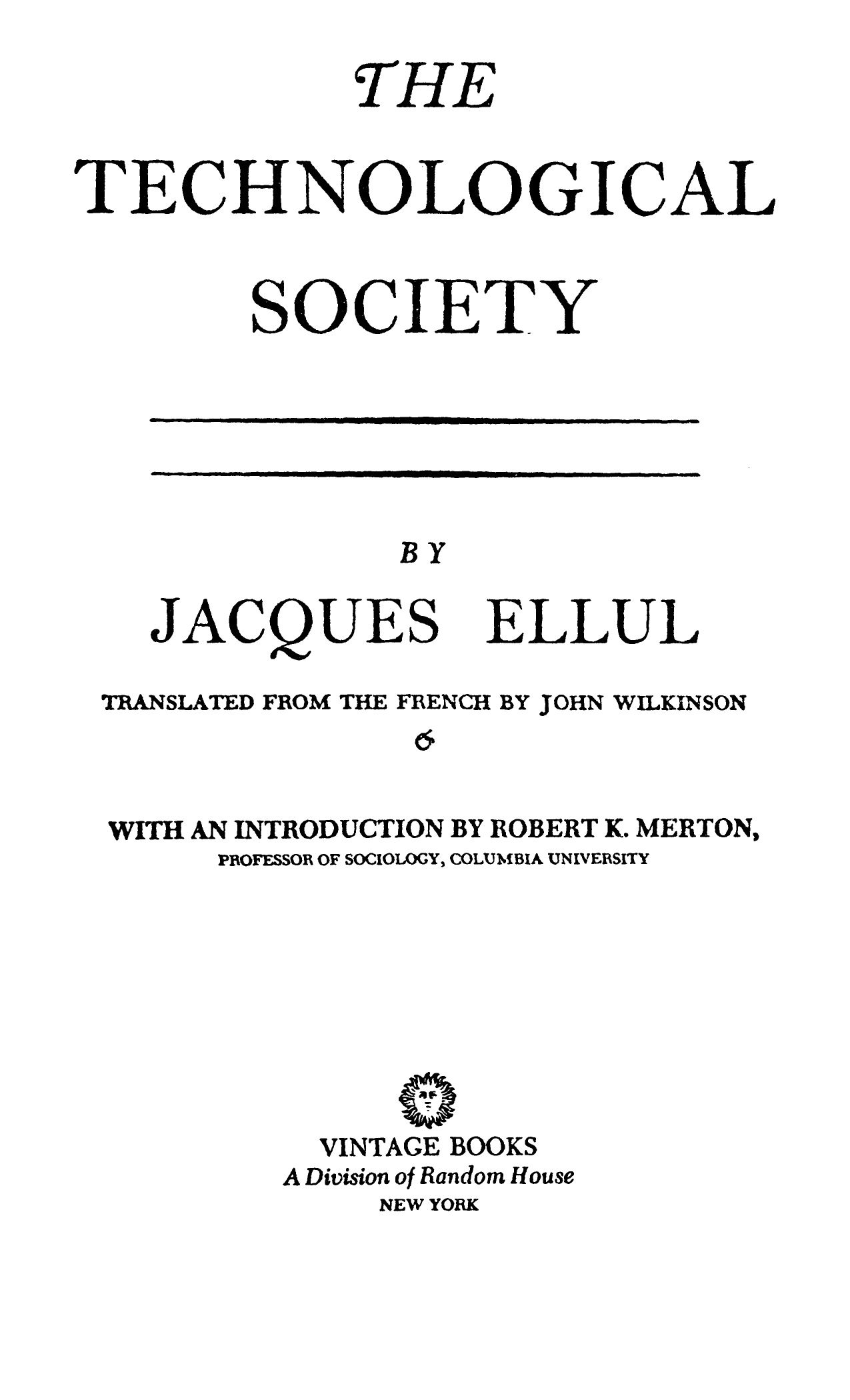Copyright, 1964, by Alfred A. Knopf, Inc. All rights reserved under International and Pan-American Copyright Conventions. Distributed in Canada by Random House of Canada Limited, Toronto.
Statement from the Publisher
I would never have heard of this book and its author were it not for my friend W. H. Ferry, Vice-President of the Center for the Study of Democratic Institutions of the Fund for the Republic, Inc., at Santa Barbara, California.
Sometime in 1961, Robert M. Hutchins and Scott Buchanan told Aldous Huxley of the Centers interest in technology and asked his opinion about contemporary European works on the subject. Huxley recommended above all Elluls La Technique, which had been published in Paris by Armand Colin in 1954 without having attracted much attention. At any rate the copies of the French original which the Center hastened to procure were from the first edition, as was also the copy I secured after my old friend Ferry had written me about it.
I couldnt possibly read Elluls French, which apart from the matters with which he deals is very difficult, but since Scott Buchanan and Columbias distinguished sociologist Robert K. Merton both said the book deserved publication in English, and since Mr. Buchanan had a translator at hand in John Wilkinson of the Center staff, who was willing to tackle this difficult and almost sure to be thankless job, I committed our firm to an undertaking that I soon began to call Knopfs folly.
Members of the Center met Ellul in Greece in 1961, where he attended a conference as the Centers guest and read a paper he had written at their request. They later paid him for a new introduction he had written for the American edition of La Technique. And the Center also helped to defray some extraordinary expenses incurred by Professor Wilkinson in the course of his work.
I wish belatedly to thank the Center publicly for all they did to help us with one of the most difficult editorial tasks Alfred A. Knopf, Inc., has ever undertaken. This note should have appeared in our first printing and I am sorry it did not.

Foreword
In The Technological Society, Jacques Ellul formulates a comprehensive and forceful social philosophy of our technical civilization. Less penetrating than Thorstein Veblens The Engineers and the Price System, it nevertheless widens the scope of inquiry into the consequences of having a society pervaded by technicians. Elluls book is more colorful and incisive than Oswald Spenglers Man and Technicswhich by contrast seems faded and unperceptiveand it is more analytical than Lewis Mumfords trilogyalthough Ellul handles the historical evidence much more sparingly and with less assurance than Mumford. And it is more far-ranging and systematic than Siegfried Giedions Mechanization Takes Command, which, of all the books overlapping Elluls subject, comes close to giving the reader a sense of what the dominance of technique might mean for the present and the future of man. In short, whatever its occasional deficiencies, The Technological Society requires us to examine anew what the author describes as the essential tragedy of a civilization increasingly dominated by technique.
Despite Elluls forceful emphasis upon the erosion of moral values brought about by technicism, he has written neither a latter-day Luddite tract nor a sociological apocalypse. He shows that he is thoroughly familiar with the cant perpetuated by technophobes and for the most part manages to avoid their clichs. Indeed, he takes these apart with masterly skill to show them for the empty assertions they typically are. Neither does he merely substitute a high moral tone or noisy complaints for tough-minded analysis. His contribution is far more substantial. He examines the role of technique in modern society and offers a system of thought that, with some critical modification, can help us understand the forces behind the development of the technical civilization that is distinctively ours.
Enough of Elluls idiosyncratic vocabulary has survived the hazards of transoceanic migration to require us to note the special meanings he assigns to basic terms. By technique, for example, he means far more than machine technology. Technique refers to any complex of standardized means for attaining a predetermined result. Thus, it converts spontaneous and unreflective behavior into behavior that is deliberate and rationalized. The Technical Man is fascinated by results, by the immediate consequences of setting standardized devices into motion. He cannot help admiring the spectacular effectiveness of nuclear weapons of war. Above all, he is committed to the never-ending search for the one best way to achieve any designated objective.
Ours is a progressively technical civilization: by this Ellul means that the ever-expanding and irreversible rule of technique is extended to all domains of life. It is a civilization committed to the quest for continually improved means to carelessly examined ends. Indeed, technique transforms ends into means. What was once prized in its own right now becomes worthwhile only if it helps achieve something else. And, conversely, technique turns means into ends. Know-how takes on an ultimate value.
The vital influence of technique is of course most evident in the economy. It produces a growing concentration of capital (as was presciently observed by Marx). Vast concentrations of capital require increasing control by the state. Once largely confined within the business firm, planning now becomes the order of the day for the economy as a whole. The dominance of technique imposes centralism upon the economy (despite comparatively inconsequential efforts to decentralize individual industrial firms), for once technique develops beyond a given degree, there is no effective alternative to planning. But this inevitable process is impersonal.
Only the nave can really believe that the world-wide movement toward centralism results from the machinations of evil statesmen.
The intellectual discipline of economics itself becomes technicized. Technical economic analysis is substituted for the older political economy included in which was a major concern with the moral structure of economic activity. Thus doctrine is converted into procedure. In this sphere as in others, the technicians form a closed fraternity with their own esoteric vocabulary. Moreover, they are concerned only with what is, as distinct from what ought to be.
Politics in turn becomes an arena for contention among rival techniques. The technician sees the nation quite differently from the political man: to the technician, the nation is nothing more than another sphere in which to apply the instruments he has developed. To him, the state is not the expression of the will of the people nor a divine creation nor a creature of class conflict. It is an enterprise providing services that must be made to function

